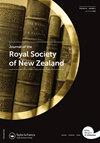He Tamariki Kokoti Tau: Whānau of preterm Māori infants (pēpi) reflect on their journeys from birth to first birthday
IF 2.1
4区 综合性期刊
Q2 MULTIDISCIPLINARY SCIENCES
引用次数: 1
Abstract
ABSTRACT An infant arriving early disrupts the birth imaginary of whānau (family collectives) and situates them in unfamiliar health environments that may not be culturally safe. Regaining a sense of familiarity enables whānau to cope with their unexpected preterm trajectory. He Tamariki Kokoti Tau: Babies Born Prematurely was the first Kaupapa Māori prospective qualitative longitudinal study to explore these trajectories, walking alongside whānau from birth to first birthday. This interpretative phenomenological analysis explores the final ‘first birthday’ interviews with 16 whānau. Concerns that had been raw in early days of neonatal intensive care carried over – frustrating whānau yet strengthening their resolve to support each other. Whānau described how they enacted resilience together, with their whānau collective including health practitioner champions who became ‘like whānau’ by virtue of their culturally responsive care. While pēpi (infants) continued to experience health issues, whānau felt hopeful for the year ahead. They expressed love, joy, and pride for their pēpi as the centre of their whānau. Whānau are experts of their pēpi, and healthcare champions who recognise this and promote whānau tino-rangatiratanga (autonomy) make a world of difference. Health services can learn from these whānau, about how to better support preterm care pathways for Māori.He Tamariki Kokoti Tau:毛利早产儿的Whānau(pāpi)反思了他们从出生到一岁生日的旅程
摘要:婴儿提前出生打乱了whānau(家庭集体)的出生想象,并将他们置于文化上不安全的陌生健康环境中。恢复熟悉感使whānau能够应对他们意外的早产轨迹。He Tamariki Kokoti Tau:《早产婴儿》是第一项探索这些轨迹的Kauppa毛利前瞻性定性纵向研究,从出生到一岁生日都与whānau同行。这一解释性现象学分析探讨了对16个whānau的最后一次“一岁生日”采访。在新生儿重症监护的早期,人们一直担心这一点,这让whānau感到沮丧,但也增强了他们相互支持的决心。Whānau描述了他们是如何共同建立韧性的,他们的Whānou集体包括健康从业者冠军,他们凭借对文化的回应而变得“像Whánau”。虽然婴儿继续面临健康问题,但whānau对未来一年充满希望。他们表达了爱、喜悦和自豪,因为他们的pāpi是他们whānau的中心。Whānau是他们的pāpi的专家,而认识到这一点并促进Whánau tino rangatiratanga(自治)的医疗保健倡导者则带来了巨大的不同。卫生服务部门可以从这些whānau中学习如何更好地支持毛利人的早产护理途径。
本文章由计算机程序翻译,如有差异,请以英文原文为准。
求助全文
约1分钟内获得全文
求助全文
来源期刊

Journal of the Royal Society of New Zealand
综合性期刊-综合性期刊
CiteScore
4.60
自引率
0.00%
发文量
74
审稿时长
3 months
期刊介绍:
Aims: The Journal of the Royal Society of New Zealand reflects the role of Royal Society Te Aparangi in fostering research and debate across natural sciences, social sciences, and the humanities in New Zealand/Aotearoa and the surrounding Pacific. Research published in Journal of the Royal Society of New Zealand advances scientific knowledge, informs government policy, public awareness and broader society, and is read by researchers worldwide.
 求助内容:
求助内容: 应助结果提醒方式:
应助结果提醒方式:


